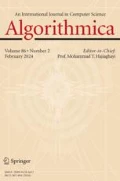Abstract
The paper considers scheduling jobs online to minimize the objective \(\sum _{i \in [n]}w_ig(C_i-r_i)\), where \(w_i\) is the weight of job i, \(r_i\) is its release time, \(C_i\) is its completion time and g is any non-decreasing convex function. It is known that the clairvoyant algorithm Highest-Density-First (HDF) is \((2+\epsilon )\)-speed O(1)-competitive for this objective on a single machine for any fixed \( 0< \epsilon < 1\) (Im et al., in: ACM-SIAM symposium on discrete algorithms, pp 1254–1265, 2012). In this paper, we give the first non-trivial results for this problem when g is a non-decreasing convex function and the algorithm must be non-clairvoyant. More specifically, our results include:
-
A \((2+\epsilon )\)-speed O(1)-competitive non-clairovyant algorithm on a single machine for all non-decreasing convex g, matching the performance of HDF for any fixed \( 0< \epsilon < 1\).
-
A \((3+\epsilon )\)-speed O(1)-competitive non-clairovyant algorithm on multiple identical machines for all non-decreasing convex g for any fixed \( 0< \epsilon < 1\).
The paper gives the first non-trivial upper-bound on multiple machines even if the algorithm is allowed to be clairvoyant. All performance guarantees above hold for all non-decreasing convex functions gsimultaneously. The positive results are supplemented by almost matching lower bounds. We show that any algorithm that is oblivious to g is not O(1)-competitive with speed augmentation less than 2 on a single machine. Further, any non-clairvoyent algorithm that knows the function g cannot be O(1)-competitive with speed augmentation less than \(\sqrt{2}\) on a single machine or \((2-\frac{1}{m})\) on m identical machines.
Similar content being viewed by others
References
Anand, S., Garg, N., Kumar, A.: Resource augmentation for weighted flow-time explained by dual fitting. In: ACM-SIAM Symposium on Discrete Algorithms, pp. 1228–1241 (2012)
Avrahami, N., Azar, Y.: Minimizing total flow time and total completion time with immediate dispatching. In: ACM Symposium on Parallel Algorithms and Architectures, pp. 11–18 (2003)
Awerbuch, B., Azar, Y., Leonardi, S., Regev, O.: Minimizing the flow time without migration. SIAM J. Comput. 31(5), 1370–1382 (2002)
Azar, Y., Epstein, L., Richter, Y., Woeginger, G.J.: All-norm approximation algorithms. J. Algorithms 52(2), 120–133 (2004)
Bansal, N., Chan, H.-L.: Weighted flow time does not admit o(1)-competitive algorithms. In: ACM-SIAM Symposium on Discrete Algorithms, pp. 1238–1244 (2009)
Bansal, N., Krishnaswamy, R., Nagarajan, V.: Better scalable algorithms for broadcast scheduling. ACM Trans. Algorithms 11(1), 3:1–3:24 (2014)
Bansal, N., Pruhs, K.: Server scheduling to balance priorities, fairness, and average quality of service. SIAM J. Comput. 39(7), 3311–3335 (2010)
Bansal, N., Pruhs, K.: The geometry of scheduling. SIAM J. Comput. 43(5), 1684–1698 (2014)
Becchetti, L., Leonardi, S.: Nonclairvoyant scheduling to minimize the total flow time on single and parallel machines. J. ACM 51(4), 517–539 (2004)
Becchetti, L., Leonardi, S., Marchetti-Spaccamela, A., Pruhs, K.: Online weighted flow time and deadline scheduling. J. Discret. Algorithms 4(3), 339–352 (2006)
Bender, M.A., Chakrabarti, S., Muthukrishnan, S.: Flow and stretch metrics for scheduling continuous job streams. In: ACM-SIAM Symposium on Discrete Algorithms, pp. 270–279 (1998)
Borodin, A., El-Yaniv, R.: On ranomization in online computation. In: IEEE Conference on Computational Complexity, pp. 226–238 (1997)
Bussema, C., Torng, E.: Greedy multiprocessor server scheduling. Oper. Res. Lett. 34(4), 451–458 (2006)
Chekuri, C., Goel, A., Khanna, S., Kumar, A.: Multi-processor scheduling to minimize flow time with epsilon resource augmentation. In: ACM Symposium on Theory of Computing, pp. 363–372 (2004)
Chekuri, C., Im, S., Moseley, B.: Online scheduling to minimize maximum response time and maximum delay factor. Theory Comput. 8(1), 165–195 (2012)
Chekuri, C., Khanna, S., Zhu, A.: Algorithms for minimizing weighted flow time. In: ACM Symposium on Theory of Computing, pp. 84–93 (2001)
Edmonds, J., Im, S., Moseley, B.: Online scalable scheduling for the \(\ell _k\)-norms of flow time without conservation of work. In: ACM-SIAM Symposium on Discrete Algorithms, pp. 109–119 (2011)
Edmonds, J., Pruhs, K.: Scalably scheduling processes with arbitrary speedup curves. ACM Trans. Algorithms 8(3), 28:1–28:10 (2012)
Fox, K., Moseley, B.: Online scheduling on identical machines using SRPT. In: ACM-SIAM Symposium on Discrete Algorithms (2011)
Im, S., Moseley, B.: An online scalable algorithm for minimizing \(\ell _k\)-norms of weighted flow time on unrelated machines. In: ACM-SIAM Symposium on Discrete Algorithms (2011)
Im, S., Moseley, B.: Fair scheduling via iterative quasi-uniform sampling. In: Proceedings of the Twenty-Eighth Annual ACM-SIAM Symposium on Discrete Algorithms, SODA 2017, Barcelona, Spain, Hotel Porta Fira, 16-19 January, pp. 2601–2615, (2017)
Im, S., Moseley, B., Pruhs, K.: Online scheduling with general cost functions. In: ACM-SIAM Symposium on Discrete Algorithms, pp. 1254–1265 (2012)
Kalyanasundaram, B., Pruhs, K.: Speed is as powerful as clairvoyance. J. ACM 47(4), 617–643 (2000)
Kumar, V.S.A., Marathe, M.V., Parthasarathy, S., Srinivasan, A.: A unified approach to scheduling on unrelated parallel machines. J. ACM 56(5), 28 (2009)
Leonardi, S., Raz, D.: Approximating total flow time on parallel machines. J. Comput. Syst. Sci. 73(6), 875–891 (2007)
Phillips, C.A., Stein, C., Torng, E., Wein, J.: Optimal time-critical scheduling via resource augmentation. Algorithmica 32(2), 163–200 (2002)
Pruhs, K., Sgall, J., Torng, E.: Handbook of Scheduling: Algorithms, Models, and Performance Analysis, chapter Online Scheduling (2004)
Acknowledgements
The authors would like to thank the anonymous reviewers of previous versions of this paper for their helpful, and sometimes quite detailed, comments and suggestions.
Author information
Authors and Affiliations
Corresponding author
Additional information
Publisher's Note
Springer Nature remains neutral with regard to jurisdictional claims in published maps and institutional affiliations.
K. Fox was supported in part by the Department of Energy Office of Science Graduate Fellowship Program (DOE SCGF), made possible in part by the American Recovery and Reinvestment Act of 2009, administered by ORISE-ORAU under Contract No. DE-AC05-06OR23100.
S. Im was supported in part by NSF awards CCF-1409130 and CCF-1617653.
J. Kulkarni was supported by NSF awards CCF-0745761, CCF-1008065, and CCF-1348696.
Rights and permissions
About this article
Cite this article
Fox, K., Im, S., Kulkarni, J. et al. Non-clairvoyantly Scheduling to Minimize Convex Functions. Algorithmica 81, 3746–3764 (2019). https://doi.org/10.1007/s00453-019-00597-2
Received:
Accepted:
Published:
Issue Date:
DOI: https://doi.org/10.1007/s00453-019-00597-2




